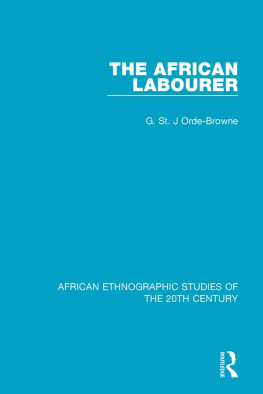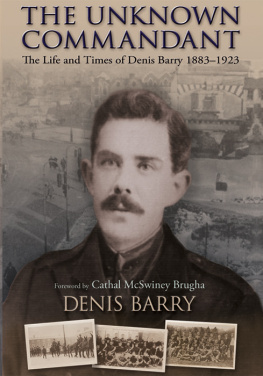D ENIS ORDE served as an Army Officer during National Service and then in the Territorial Army. He read Law at Oxford University and was called to the Bar in 1956 as a prizeman of the Inner Temple and then spent twenty-three years in practice as a Barrister, eight of them as a Recorder, followed by twenty-two years as a Crown Court Judge, fifteen of them as the Presiding Judge of a Crown Court and six of them as Chairman of the Criminal Justice Committee for two Counties and a President of Mental Health Review Tribunals. He remains a Master of the Bench at the Inner Temple Inn of Court.
He is the author of In the Shadow of Nelson: The Life of Admiral Lord Collingwood (Pen & Sword Maritime, 2008) and was a contributor to The New Oxford Dictionary of National Biography.
Denis Orde lives with his wife in his native Northumberland and in Oxford.
First published in Great Britain in 1997 by The Pentland Press Limited
Reprinted in this format in 2014 by
PEN & SWORD MARITIME
An imprint of
Pen & Sword Books Ltd
47 Church Street
Barnsley, South Yorkshire
S70 2AS
Copyright Denis Orde, 1997, 2014
ISBN 978 1 78346 290 2
The right of Denis Orde to be identified as Author
of this work has been asserted by him in accordance with
the Copyright, Designs and Patents Act 1988.
A CIP catalogue record for this book is available from the British Library
All rights reserved. No part of this book may be reproduced or
transmitted in any form or by any means, electronic or mechanical
including photocopying, recording or by any information storage and
retrieval system, without permission from the Publisher in writing.
Printed and bound in England
By CPI Group (UK) Ltd, Croydon, CR0 4YY
Pen & Sword Books Ltd incorporates the Imprints of Aviation, Atlas,
Family History, Fiction, Maritime, Military, Discovery, Politics, History,
Archaeology, Select, Wharncliffe Local History, Wharncliffe True Crime,
Military Classics, Wharncliffe Transport, Leo Cooper, The Praetorian Press,
Remember When, Seaforth Publishing and Frontline Publishing
For a complete list of Pen & Sword titles please contact
PEN & SWORD BOOKS LIMITED
47 Church Street, Barnsley, South Yorkshire, S70 2AS, England
E-mail: enquiries@pen-and-sword.co.uk
Website: www.pen-and-sword.co.uk
FOR MY WIFE JANE AND MY
DAUGHTERS GEORGINA AND PHILIPPA.
CONTENTS
The illustrations on pp. 66, 91 and 194 are reproduced by kind permission of the National Maritime Museum, Greenwich. The remainder are from prints in the authors own collection.
On two occasions only during the Revolutionary and Napoleonic Wars did the French seriously threaten to invade the British Isles, once in the year 17978 and again between the years 1803 and 1805.
In the spring of the year 1798 matters were coming to a head in the long war between the two nations for there were reports of great activity by the French. Sources of intelligence told the British Government that an expeditionary force had been massed at Toulon and at other ports in the Mediterranean ready for embarkation. The danger of invasion therefore looked to be imminent but its destination remained unknown. The belief in Britain was that it was headed for these shores and alarm bells had begun to sound in the corridors of Whitehall for Bonaparte was by now all but master of Europe and Britains feared the worst. Clearly the need now was for a squadron of ships to re-enter the Mediterranean which they should never have left, hunt down the French Fleet and destroy it. Command of such a force would very obviously carry with it immense responsibility and great prestige. It called for an officer of outstanding skill and determination. Indeed there can have been few appointments made in the long history of the British Royal Navy of more crucial importance to the defence of the nation, or, even, of Western Europe for at this moment in time Great Britain really stood alone against the French invader and the might of Napoleon Bonapartes all-conquering army. It is surprising therefore that the provenance of the appointment has been so little explored.
But it is more astonishing to find that several British admirals were at war, not just with the enemy at this time of national emergency, but also with one another. So much so that a duel was challenged in the year 1799 and would have taken place but for the timely intervention of George III. The concern of this work is to trace the events which set these high-ranking officers on collision course and to measure the extent to which, if at all, the advancement of Horatio Nelson to command of the Mediterranean Squadron was the cause of it. It is an account of pride, preferment and prize money, for there was a considerable golden harvest in the countdown to Trafalgar which so exercised the mind and pen of Horatio Nelson.
History can but be written through the lives of those to whom the nations affairs have been entrusted at any given time, but at these critical moments a small number of naval officers, perhaps driven on by naked ambition, but undoubtedly stiffened by a strong sense of patriotism, succeeded in writing themselves into the pages of history. All were very different characters and of varying achievement. Not all may have shared Nelsons pathological hatred of the French, but throughout their lives the common enemy was France. Many of them no more than walked in the shadow of those giants who strode the national stage at the turn of the eighteenth century, those few men who so dominated the life of the nation at one of the most dangerous periods of its history, amongst them Pitt, St Vincent, Nelson, and, later, Wellington, all men of magisterial greatness. So much so that little is ever written of others who also had a role to play. But at least each one could count himself fortunate to have served in the Royal Navy through what undoubtedly were some of the most glorious years in its long and distinguished history, crowned as they were by Nelsons three great victories at the Nile, Copenhagen and off Cape Trafalgar.
In order to be able to understand and judge the bizarre events of the years 1798, 1799, 1804 and 1805, the year of Trafalgar, it has been necessary in this work to look back a little at the service careers of some of those naval officers who stood at the very centre of the storm which was to be given such prominence in The Times newspaper of the day, including that of the autocratic, formidable, austere and thoroughly difficult St Vincent who had dedicated his entire life to mastery of his profession, whose twin contributions to the defence of the Realm were to transform an ill-disciplined and largely mercantile marine into a well organized fighting machine which was to achieve pre-eminence in the waters of the world in the ten years which followed his assumption of command in the Mediterranean in the year 1795, and then to unleash the brilliance of Horatio Nelson and place him at its head, and at the disposal of the British nation. This was his legacy and these were his lasting monuments. He left behind order and purpose where there was none before that of the flamboyant, theatrical, petulant but inspirational Nelson himself, the ornament of the service of whom so much has been written; of the proud Northumbrian Admiral Sir John Orde, the target of so much of their acrimony until he along with countless others made his way to St Pauls Cathedral on 9 January of the year 1806 to pay homage to Horatio Nelson as a pall-bearer at his funeral; of the apoplectic and courageous Sir William Parker, also a contender for the crown; of the gentle Collingwood, perhaps the noblest sailor of them all; and of many others, much of it as seen through the eyes of those with whom they served.












